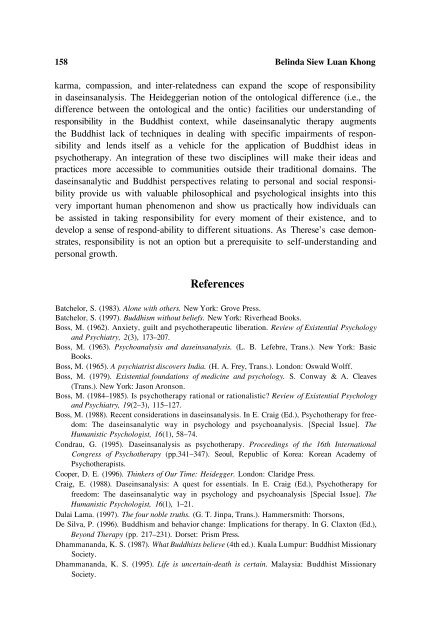Psychology & Buddhism.pdf
Psychology & Buddhism.pdf
Psychology & Buddhism.pdf
Create successful ePaper yourself
Turn your PDF publications into a flip-book with our unique Google optimized e-Paper software.
158 Belinda Siew Luan Khong<br />
karma, compassion, and inter-relatedness can expand the scope of responsibility<br />
in daseinsanalysis. The Heideggerian notion of the ontological difference (i.e., the<br />
difference between the ontological and the ontic) facilities our understanding of<br />
responsibility in the Buddhist context, while daseinsanalytic therapy augments<br />
the Buddhist lack of techniques in dealing with specific impairments of responsibility<br />
and lends itself as a vehicle for the application of Buddhist ideas in<br />
psychotherapy. An integration of these two disciplines will make their ideas and<br />
practices more accessible to communities outside their traditional domains. The<br />
daseinsanalytic and Buddhist perspectives relating to personal and social responsibility<br />
provide us with valuable philosophical and psychological insights into this<br />
very important human phenomenon and show us practically how individuals can<br />
be assisted in taking responsibility for every moment of their existence, and to<br />
develop a sense of respond-ability to different situations. As Therese’s case demonstrates,<br />
responsibility is not an option but a prerequisite to self-understanding and<br />
personal growth.<br />
References<br />
Batchelor, S. (1983). Alone with others. New York: Grove Press.<br />
Batchelor, S. (1997). <strong>Buddhism</strong> without beliefs. New York: Riverhead Books.<br />
Boss, M. (1962). Anxiety, guilt and psychotherapeutic liberation. Review of Existential <strong>Psychology</strong><br />
and Psychiatry, 2(3), 173–207.<br />
Boss, M. (1963). Psychoanalysis and daseinsanalysis. (L. B. Lefebre, Trans.). New York: Basic<br />
Books.<br />
Boss, M. (1965). A psychiatrist discovers India. (H. A. Frey, Trans.). London: Oswald Wolff.<br />
Boss, M. (1979). Existential foundations of medicine and psychology. S. Conway & A. Cleaves<br />
(Trans.). New York: Jason Aronson.<br />
Boss, M. (1984–1985). Is psychotherapy rational or rationalistic? Review of Existential <strong>Psychology</strong><br />
and Psychiatry, 19(2–3), 115–127.<br />
Boss, M. (1988). Recent considerations in daseinsanalysis. In E. Craig (Ed.), Psychotherapy for freedom:<br />
The daseinsanalytic way in psychology and psychoanalysis. [Special Issue]. The<br />
Humanistic Psychologist, 16(1), 58–74.<br />
Condrau, G. (1995). Daseinsanalysis as psychotherapy. Proceedings of the 16th International<br />
Congress of Psychotherapy (pp.341–347). Seoul, Republic of Korea: Korean Academy of<br />
Psychotherapists.<br />
Cooper, D. E. (1996). Thinkers of Our Time: Heidegger. London: Claridge Press.<br />
Craig, E. (1988). Daseinsanalysis: A quest for essentials. In E. Craig (Ed.), Psychotherapy for<br />
freedom: The daseinsanalytic way in psychology and psychoanalysis [Special Issue]. The<br />
Humanistic Psychologist, 16(1), 1–21.<br />
Dalai Lama. (1997). The four noble truths. (G. T. Jinpa, Trans.). Hammersmith: Thorsons,<br />
De Silva, P. (1996). <strong>Buddhism</strong> and behavior change: Implications for therapy. In G. Claxton (Ed.),<br />
Beyond Therapy (pp. 217–231). Dorset: Prism Press.<br />
Dhammananda, K. S. (1987). What Buddhists believe (4th ed.). Kuala Lumpur: Buddhist Missionary<br />
Society.<br />
Dhammananda, K. S. (1995). Life is uncertain-death is certain. Malaysia: Buddhist Missionary<br />
Society.











